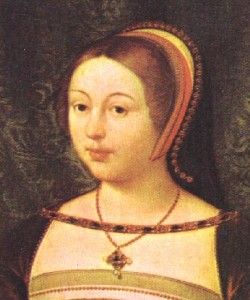
Many people seem to think that Thomas Boleyn, father of Queen Anne Boleyn, only rose to prominence and favour in Henry VIII’s reign, in the 1520s, by ‘pimping out’ his daughters to the king, but it’s not true at all – click here for more on Thomas Boleyn’s career. As early as 1503, Thomas Boleyn was being chosen by the king for a real honour.
On 6th May 1503, Henry VII sent letters from Richmond Palace to those chosen to accompany his eldest daughter, Margaret, to Scotland for her marriage to King James IV. Thomas Boleyn was one of those chosen. We know from the King’s letter to Sir Henry Vernon that those chosen were told to avoid wearing “any mornyng or sorofull clothinges” and instead to wear their “best arraye”.1
As well as “Maister Bolen, son and eyre of Sir William Bolen”, the “List of persons who accompanied the Queen into Scotland” included the Archbishop of York, the Bishop of Durham, the Earl of Surrey (Thomas’s father-in-law), Sir Richard Pole, Sir Edward Stanley, Sir Thomas Darcy, Sir Walter Hungerford and Sir John Husee.” Thomas’s name appeared in the list of those that attended the wedding feast “that be no knyghtes”.2
The retinue had left Richmond Palace on for the home of Margaret’s paternal grandmother, Lady Margaret Beaufort, at Collyweston in Northamptonshire on 27th June 1503, being accompanied by Henry VII on this first leg of the journey. They spent eleven days with Lady Beaufort before starting the journey north on 8th July 1503. Stops included Grantham, York, Durham, Newcastle and Berwick, which was, at the time, held by England. They arrived in Scotland on 1st August and the wedding took place at Holyrood Palace, Edinburgh, on 8th August.3
Thomas Boleyn may not have been a knight in 1503, but he and his father appeared to be in favour. It was the start of an incredible career serving the monarch.
Also on this day in history, 8th July 1553, Mary Tudor, daughter of Henry VIII, declared herself Queen following Edward VI’s death – click here to read more.
Notes and Sources
- The manuscripts of His Grace the Duke of Rutland: preserved at Belvoir castle, Twelfth Report, Appendix, Part IV, Vol, I, p. 17. Read at https://archive.org/stream/hists52199677#page/n3/mode/2up
- Ibid., p. 18.
- Dean, William Hughes, Sir Thomas Boleyn: The courtier diplomat, 1477-1539, Ph.D thesis, West Virginia University, 1987, p. 28.